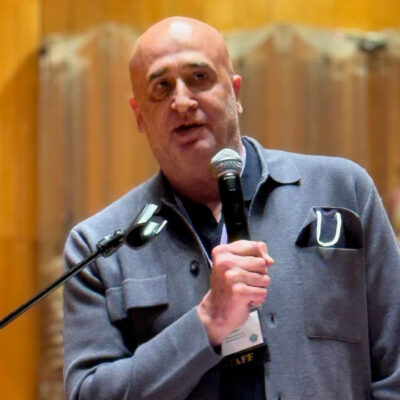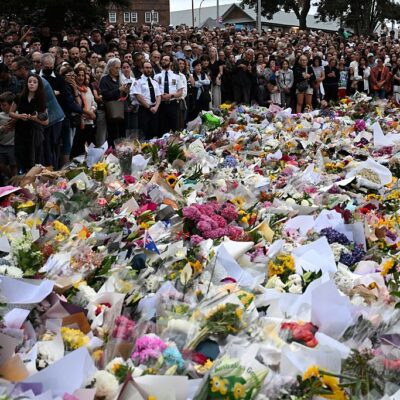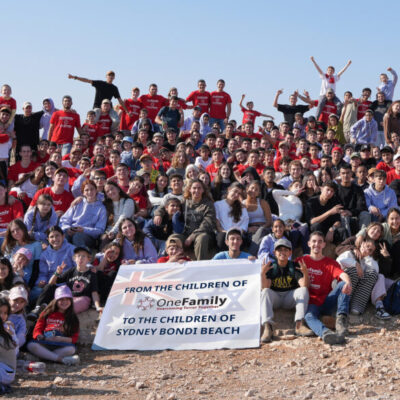Opinion
Jewish day schools: Building leaders, not just students
As parents and grandparents, we want to give our children the best opportunities. We strive to provide them with an education that not only helps them succeed academically but also shapes their character and identity. But how can we be sure that the values we hold dear — our Jewish heritage, our connection to Israel and our sense of community — are truly passed on to the next generation?
For Hannah Nash, a graduate of the Jewish Day School in Bellevue, Wash., this question has already been answered. Hannah’s story is one that speaks directly to Jewish families who might be wondering if investing in a Jewish day school education is worth it. Spoiler alert: It is, and it’s likely to impact your child’s future in ways you haven’t even imagined.
Hannah’s Jewish day school experience was more than a series of classes — it was the foundation of her Jewish identity. Reflecting on her time at the school, she explains how seamlessly integrated Jewish identity and practices were in students’ everyday experiences: “It was normal to do prayers each day, learn Hebrew, and have half the school day dedicated to learning about Jewish history and values.” But what she didn’t realize then was how these early lessons would one day shape her response to a world that would be dramatically different than the one she grew up in.
Hannah explained how in kindergarten each student was presented with a siddur in a special school ceremony. “We were given a personalized siddur that our parents had decorated for each of us and that we used all throughout our years at the school. It came with us from classroom to classroom, whatever grade we were in.” These were not just school events, they were profound moments that tied her to her heritage. Looking back, she recalls tefillah as her favorite time of the week. “My teachers made it fun, and I loved singing Debbie Friedman songs,” she says. “That’s when I felt most connected to my religion, even if I didn’t fully realize it at the time.”
This sense of belonging and deep-rooted identity prepared her in ways her family couldn’t have anticipated.
Rising to the moment: Standing up amid campus antisemitism
No one could have predicted that Jewish students like Hannah would one day face intense antisemitism on college campuses. As a student at the University of Washington, Hannah experienced firsthand the surge of hostility toward Jews and Israelis especially, following the Hamas attack on Israel on Oct. 7. Campus protests calling for the destruction of Israel, antisemitic graffiti and blood libel against Israel as a country and Jews as a people made her feel unsafe. But she drew on her Jewish day school foundation to give her the strength to speak up when it mattered most.

After a year of campus chaos, Hannah was asked to testify about her student experiences at a University of Washington Board of Regents meeting — a meeting that would make national and international headlines across the Jewish community. “I don’t consider myself super political or a big activist. But this is an issue I have a lot of education on, so when a family friend asked me to testify, I knew I had to say something. I have the knowledge and I was living the experience. This wasn’t something I could watch from the sidelines,” Hannah explains.
Hannah’s defining moment
The meeting where Hannah spoke became a flashpoint after a year of rising antisemitism on the University of Washington campus. What should have been an orderly public comment period quickly descended into chaos. As Hannah and other Jewish community members, including Solly Kane, the CEO of the Jewish Federation of Greater Seattle, attempted to speak, they were shouted down by protestors. The disruption was so extreme that the regents were forced to shut down the meeting entirely, and protestors took over the room. In the midst of an intimidating uproar, Hannah, who was the only student who was there to testify, stood her ground, displaying uncommon calm and courage in a challenging moment.
Nevet Basker, a University of Washington alumna and Jewish community leader who also spoke at the Board of Regents meeting, explains: “Hannah remained cool and poised under difficult circumstances and in the face of a hostile environment – not only at the regents’ meeting but all year on campus. Her maturity, grace, and strength of character were evident. And her day-school education also gets credit for inspiring Hannah’s strong Jewish identity and her commitment to being an ‘upstander,’ one who speaks out and takes action when faced with injustice.”
Hannah’s presence at that meeting wasn’t just a personal victory—it was part of a larger story that became a rallying point for the entire Jewish community in Greater Seattle. The Jewish Federation of Greater Seattle organized a community-wide petition, resulting in thousands of emails flooding the inboxes of the University President and the regents. What started as a chaotic, disruptive meeting turned into a powerful, unified response that no one could ignore. Hannah’s courage in stepping forward to testify made it impossible for university leadership to ignore or deny the reality of Jewish student experiences. Her calm and strength in the face of intense provocation exemplifies the kind of Jewish leadership we have seen demonstrated by Jewish day school students nationwide in this moment.
The lifelong benefits of Jewish day school
Hannah’s story underscores the profound benefits of a Jewish day school education — not just academically, but in fostering resilience, leadership and a deep-rooted Jewish identity. “Along with the wonderful support of my parents and growing up in a very Jewish home, JDS cemented my Jewish identity at a young age,” Hannah explains. “It gave me pride in my identity, and the tools to recognize antisemitism, especially when faced with gaslighting and propaganda.”
She describes how her Jewish day school education equipped her to recognize the falsehoods being spread online and on campus. “I knew what was true because I’d learned Jewish history and values in school. That knowledge gave me the confidence to hold my ground, even when people around me were misinformed.”
Jewish day school graduates in the public eye: A proven track record of success
Hannah’s example is part of a larger story of how Jewish day school graduates often go on to become strong, successful leaders in their fields, using their platforms to advocate for the Jewish community.
Consider Shabbos Kestenbaum, a Harvard University student, and graduate of SAR in Riverdale, NY has gained nationwide recognition for his proud Jewish identity and outspoken criticism of antisemitism on campus. He has testified before Congress, spoken at the Republican National Convention and become a prominent voice for the Jewish campus community on social media.
Jewish day schools have a long track record of producing strong, successful individuals who proudly represent their heritage. Jake Tapper, a well-known CNN anchor, and Pennsylvania Gov. Josh Shapiro, both attended Akiba Hebrew Academy (now the Jack M. Barrack Hebrew Academy) in Bryn Mawr, Penn. These influential figures have stood up for the Jewish people in critical moments, using their platforms to push back against anti-Israel bias and advocate for the Jewish community.
Abigail Shrier, the acclaimed author of NY Times best-selling books including, Irreversible Damage and Bad Therapy, attended Charles E. Smith Jewish Day School in Bethesda, Maryland. Alex Edelman, the comedian known for his sharp wit and Jewish-themed humor, is a proud graduate of Maimonides School in Brookline, Mass. Each of these individuals has been an outspoken advocate for Jewish values and has not hesitated to stand up for Israel and the Jewish people. It’s no surprise that they all share the common thread of a strong Jewish day school education — a foundation that gives them the knowledge, identity, and confidence to lead.
Why Jewish day school matters
Hannah may not be as famous as these other Jewish day school graduates (yet), but her resilience and willingness to speak up when so many others are reluctant to do so are a direct result of the Jewish fluency her day school education provided. Her story serves as a powerful example of how a Jewish day school education is an irreplaceable foundation for overcoming challenges of all kinds.
When you invest in a Jewish day school education, you’re investing in your child’s future—not just academically, but as a proud, confident Jew capable of facing whatever challenges lie ahead. Just as Hannah’s family couldn’t have predicted the role she would play in such a pivotal moment for Seattle’s Jewish community, you can’t foresee the exact future your child or grandchild will face. But you can be sure that they will be ready.
Melissa Rivkin is the director of day school strategy at the Seattle-based Samis Foundation.

 Add EJP on Google
Add EJP on Google










